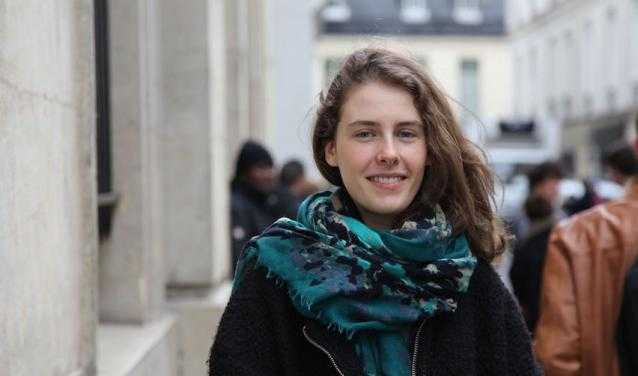Home>"You have to be a bit naive to start something like this!"

09.05.2016
"You have to be a bit naive to start something like this!"
Alyette Tritsch, a student in first year of the Master of International Development at the Paris School of International Affairs at Sciences Po, initiated the Welcome Refugees project along with a group of students. Thanks to them, Sciences Po has welcomed a group of refugees in recent weeks to take courses in French and English. We asked her about this successful move to action.
How did the project to enable refugees to take courses at Sciences Po originate?
Alyette Tritsch: In September 2015, I visited some refugee camps in Paris, in a purely personal capacity. I wanted to see what was going on, and I thought it would be an opportunity to meet people who speak Arabic, which I learned during my undergraduate studies at the Sciences Po campus in Menton. Among the refugees, there were lots of young people who wanted to resume their studies. Everyone was asking me how they could get into university. After that, I simply wrote an appeal on Facebook asking who wanted to do something. And that's how it all started.
You then decided to act. How did you go about it?
A. T.: We formed a group of Sciences Po students, which we then expanded. Thanks to two German students who put us in touch with Kiron, an NGO that offers free online courses to refugees worldwide, we were able to become the organisation's French branch. We then went to see the Sciences Po administration with our idea. They were very responsive; we were surprised to see that there were people interested in the project from all over Sciences Po. The vice president for studies, Myriam Dubois-Monkachi, was a key contact – she really facilitated things.
The refugee students have started classes. What is your goal now?
A. T.: These language courses are an initial opportunity for the refugees to get to know the language and how university is in France. It's very motivating for them, and the feedback has been very positive. The long-term goal for many of them is to get a degree; a lot want to resume their studies. We aim to support them in this endeavour, either through Kiron, at Sciences Po, or at other universities.
The project has received a lot of media attention...
A. T.: Honestly, we were not expecting that at all! Everyone was telling us "this is huge", but we didn't really realise. I think that the fact it is happening at Sciences Po has a lot to do with it. But we hadn't anticipated having to deal with the media at all. We had to give the project a face – mine, as it happens – whereas it is the work of a whole team. You have to respond instantly, and the requests can be disconcerting: some journalists wanted to meet refugees that came to Europe on a raft, whereas there are people who arrived by plane, and with a visa!
What have you learned from this experience?
A. T.: First you have to learn time management, to juggle your studies and the project. It's hard and it's tiring. The refugee issue is not a priority for everyone: you have to be motivated and fairly devoted. And we quickly came up against issues that are over our heads, like problems with papers, social assistance, legal aid, etc. We found ourselves, a group of 20-year-old students, discussing matters that should be organised by the state. At the same time, I think you have to be a bit naive to start something like this. If I had known before all the difficulties we would have to overcome, I'm not sure I would have done it.
What are your plans for the near future?
A. T.: I'm going to do a gap year next year, before the second year of my Master's. I would like to do a Master's in Britain on political and social issues in the Middle East. I am extremely interested in these issues, which I first got into on the Middle East-Mediterranean programme at the Sciences Po campus in Menton. After this rewarding year of action, I want to get back to an academic focus and explore my curiosity for research.